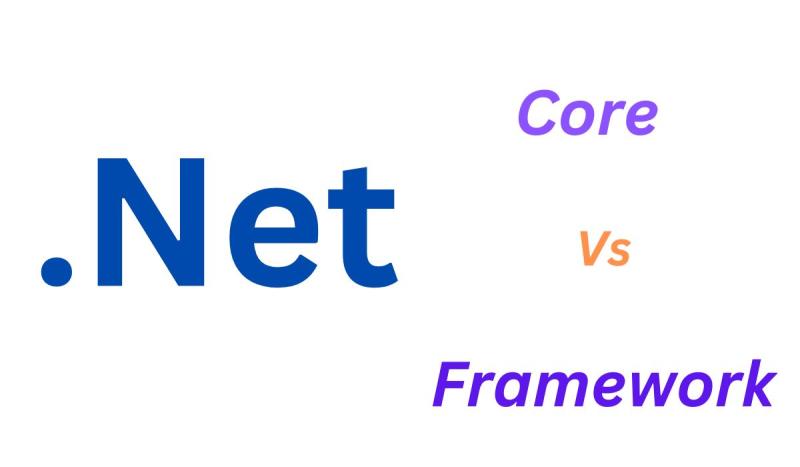Performance Showdown: .Net Core vs .Net Framework

In the ever-evolving world of
software development, choosing the right framework can significantly impact
your applications' performance, Scalability, and future-proofing. Two of the
most prominent frameworks in the .Net ecosystem are .Net Core and .Net Framework.
While both frameworks have their strengths, understanding their performance
differences is crucial for developers and businesses. This article delves into
the performance showdown between .Net Core vs .Net Framework, providing
insights to help you make an informed decision for your next project.
Understanding .Net Core and .Net Framework
Before diving into the
performance aspects, it's important to understand the fundamental differences
between .Net Core and .Net Framework.
- .Net Framework: Released by Microsoft in
2002, .Net Framework is a Windows-only platform that supports a wide range
of desktop, web, and enterprise applications. It provides a vast pre-built
code library, enabling developers to build complex applications quickly.
However, it is limited to the Windows operating system.
- .Net Core: Introduced in 2016, .Net Core is
a cross-platform, open-source framework for modern application
development. It allows developers to build and deploy applications on
Windows, Linux, and macOS. .Net Core is known for its high performance,
modular architecture, and support for microservices and cloud-native
applications.
Performance Benchmarks: .Net Core vs .Net
Framework
To truly understand the
performance differences between .Net Core and .Net Framework, we must look at
several key metrics: speed, memory usage, Scalability, and startup time.
Various studies and benchmarks have been conducted to compare these metrics across
both frameworks.
1. Speed
One of the most significant
advantages of .Net Core over .Net Framework is its speed. .Net Core is
optimized for high performance, evident in various benchmark tests.
- Response Time: .Net Core consistently
outperforms .Net Framework regarding response time. This is particularly
noticeable in web applications, where .Net Core can handle more requests
per second compared to .Net Framework.
- Throughput: .Net Core's modular architecture
allows it to achieve higher throughput. In scenarios where high
concurrency is required, .Net Core demonstrates a clear advantage,
processing more tasks in less time.
For example, in a simple web API
test, .Net Core handled 20-30% more requests per second than .Net Framework.
This performance gain is primarily attributed to the improvements in the
runtime and the reduced overhead in .Net Core.
2. Memory Usage
Memory usage is another critical
factor in determining the performance of a framework, especially in large-scale
applications.
- Garbage Collection: Both .Net Core and .Net
Framework use garbage collection to manage memory. However, .Net Core has
made significant improvements in this area. Introducing the Server Garbage
Collector in .Net Core allows for better memory management in high-load
environments, reducing the frequency of garbage collection cycles and
minimizing pauses during execution.
- Memory Footprint: .Net Core generally has a
smaller memory footprint than .Net Framework. This is due to its modular
nature, where only the necessary components are included in the runtime,
as opposed to the more monolithic .Net Framework.
In practical terms, applications
built on .Net Core can run more efficiently on the same hardware than those
built on .Net Framework.
3. Scalability
Scalability is a crucial
consideration for modern applications, especially those that need to handle a
growing user base or increasing data volumes.
- Horizontal Scalability: .Net Core's support
for microservices and containerization makes it more scalable than .Net
Framework. With .Net Core, you can easily scale your application
horizontally by deploying services across multiple servers or containers.
- Cloud-Native Features: .Net Core is designed
for cloud-native applications. Its integration with modern cloud
platforms, such as Azure, allows for automatic scaling and efficient
resource management. .Net Framework, while capable, requires more manual
configuration to achieve similar Scalability.
For businesses looking to
future-proof their applications, .Net Core offers a clear advantage in
Scalability, particularly in cloud environments.
4. Startup Time
Startup time is another area
where .Net Core shines. The ability to start an application quickly is vital
when cold starts (such as serverless functions) are frequent.
- Optimized Startup: .Net Core's runtime is
optimized for faster startup times. This is particularly beneficial in
microservices architectures, where services must be spun quickly in
response to demand.
- ReadyToRun (R2R): .Net Core introduces the
ReadyToRun feature, which compiles applications into native code at build
time, reducing the Just-In-Time (JIT) compilation overhead at runtime.
This leads to significantly faster startup times compared to the .Net
Framework.
In contrast, .Net Framework
applications can experience slower startup times due to the JIT compilation
process, which occurs when the application is first executed.
Use Cases: When to Choose .Net Core vs .Net
Framework
While .Net Core generally
outperforms .Net Framework in most performance metrics, there are specific
scenarios where each framework is better suited.
Choose .Net Core if you:
- Need cross-platform compatibility.
- Require high performance and Scalability.
- Are you building cloud-native or
microservices-based applications?
- Want to leverage the latest advancements in .Net
technology?
Choose .Net Framework if you:
- Are you maintaining or updating an existing
Windows-only application?
- Rely on libraries or technologies that .Net Core
does not yet support.
- Have no immediate need for cross-platform
capabilities.
Conclusion
The performance showdown between
.Net Core and .Net Framework reveals a clear winner in most cases. .Net Core's
modern, modular architecture, cross-platform support, and optimized performance
make it the superior choice for new projects, especially those that demand high
Scalability and efficiency. However, the .Net Framework exists in legacy
applications and specific Windows-based environments. By understanding the
strengths and limitations of each framework, developers and businesses can make
informed decisions that align with their goals and technical requirements.










Comments